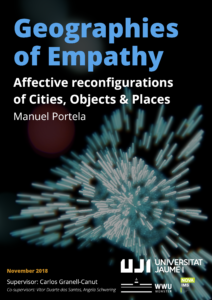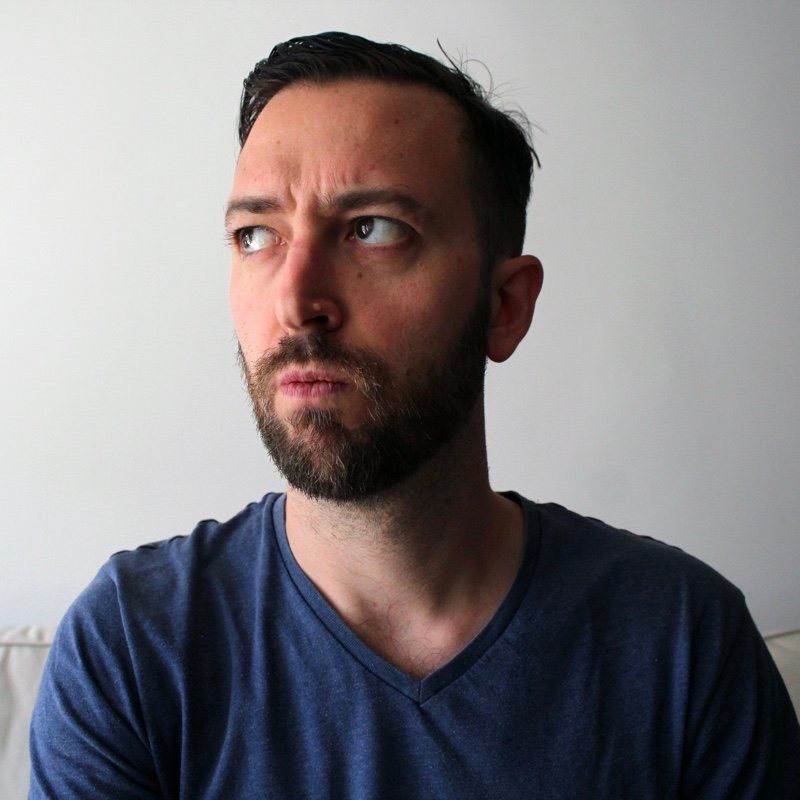I’m a Senior Postdoc and Associated Researcher and Lecturer at the Web Science and Social Computing Research Group at University Pompeu Fabra, Barcelona. I’m currently leading the DATALOG project and coordinating the European project AI-BOOST tasks on Ethical AI.
My position is also supported by the «Mitigating Harm in AI and Data-Driven Applications» project by the UPF-DTIC María de Maeztu Strategic Research Program «Artificial and Natural Intelligence for ICT and beyond».
Short Profile
I obtained my PhD under the GEO-C Joint doctorate on GeoInformatics programme, funded by the European H2020 Marie Skłodowska-Curie Actions (H2020). My bachelor degree was in graphic and interaction design and hold a Master in Urban Studies. My work is focused on the study of the urban environment and the daily life in cities, approached from multiple disciplines such as Human and Cultural Geographies, Science and Technology Studies, Human-Computer Interaction, and Urban Studies. At my current position, Portela is exploring Machine Learning algorithms in practice, through different interfaces, including human oversight and algorithm-human interaction. I’m working towards more fair and explainable artificial intelligence implementations by making them interactive by design. Since 2022 I shifted back my research topic towards urban science and data governance studies.
Additionally, within the EU funded COST Action 15212 and with the private research-oriented company, Ideas for Change, I also collaborate in Citizen Science projects. Such projects consider laypeople in the process of generating new insights, research questions and data-driven decision-making. During 2019 to 2021 I’ve been working for the EU H2020 funded project ALOHA. During 2021 and 2022 I was hired as an external expert for the European Comission’s Joint Research Center (JRC) contracted under the HUMAINT project. Currently contributing as external expert to JRC projects Public Sector Tech Watch and the Green Deal Data Space.
I’m a contributing expert at the Cities Coalition for Digital Rights and a member of the Advisory Council on Artificial Intelligence for the Ajuntament de Barcelona.
Teaching
Universitat Pompeu Fabra
- Machine Learning (undergraduate) | Courses 2020 and 2021 (3rd quarter: Apr to June) – Score: 7/10
- Databases (undergraduate) | Courses 2019 to 2023 (1st quarter: Sept to Dec) – Score: 7,5/10
- Algorithms and Data Structures I (undergraduate) | Course 2021 (2d quarter: Jan to March)
- Fairness, Accountability, Transparency and Ethics (undergrad.) | Courses 2021 to 2024 (2d quarter: Jan to March)
*All courses includes material preparation, user assessment and evaluation. 2020 courses were taught online due to COVID-19.
Visiting scholar
- Invited lecturer on Algorithmic Fairness – Master on Foundations of Data Science (Universitat de Barcelona, Spain) | Course 2022
- Coordination of Bias and Discrimination in AI – MSc in Health Management & Data Intelligence (EM Lyon, France) | Course 2022 | Syllabus
- Invited lecturer on Ciudad y Justicia de Datos (Universidad de Los Andes, Colombia) | Courses 2023 and 2024 | Funded by ERASMUS+ International 2023
Seminars and tutorials
Conferences and Workshops
- Data Justice Conference 2023 @ Cardiff University, UK – June 19-20, 2023
Past events
2020/2021
- ACM Conference on Fairness, Accountability, and Transparency (ACM FAccT*2021) @ Online – March 4th to March 10th, 2021
- ACM Conference on Fairness, Accountability, and Transparency (ACM FAT*2020) @ Barcelona, Spain – January 27th to January 30th, 2020
2019
- COST Action Workshop WG 2 & WG 4: Exploring the interplay between Human Learning and Machine Learning – The Citizen Science Perspective @ JRC Seville, Spain
- COST Action Vespucci Training School on Digital Transformations in Citizen Science and Social Innovation (CA15212) @ Fiesole, Italy
2018
- EASST 2018 Conference @ Lancaster University – 25-28/07/2018
- Affects, Interfaces, Events 2018 @ Aahrus University – 28-30/08/2018
- COST Action Workshop WG 6: Citizen Science in Social Sciences and Humanities (CA15212) @ Kaunas University of Technology
2017
- 25th European Conference on Information Systems (Workshop organization) @ Guimães, Portugal
- 18th edition of the International Conference promoted by the Spanish Human Computer Interaction Association @ Cancún, México
- 10th edition of the Digital Cities workshop (C&T2017) @ Troyes, France
- 8th International Conference on Communities & Technologies 2017 @ Troyes, France
2016
- 10th International Conference on Ubiquitous Computing and Ambient Intelligence UCAmI 2016 @ Canary Islands, Spain
Research visits and secondments
2017
- Research visit to the Digital Civics initiative @ Open Lab, Newcastle University, UK
- Research visit to the Scottish Ethnomethodology, Discourse, Interaction & Talk Research Group under the supervision of Prof. Dr. Eric Laurier @ Department of Geography, University of Edinburgh, UK
- External semester (Feb to Aug) under the supervision of Prof. Dr. Vitor Santos @ Universidade NOVA de Lisboa, Portugal
Summer Schools and Seminars
2017: Summer School on Smart Cities @ TU Wien, Vienna
2016: Summer School on Computational Interaction @ Aalto University, Helsinki
2015: Postgrade seminar on «Social Phenomenological Research» by Dr. Kenneth Liberman @ Universidad de Buenos Aires, Argentina
2014: Postgrade seminar on «Social Studies of Technology» by Dr. Hernán Thomas, Social Studies of Science and Technology @ Universidad Nacional de Quilmes, Argentina
Publications
Policy briefs and Reports
«Citizen Engagement in Urban Data Initiatives: Approaches, Challenges and Recommendations» in Human rights in the digital era: Learnings on local governance from pilots in Europe | UNHABITAT (2023)
Towards a meaningful human oversight of automated decision-making systems | Digital Future Society (2022)
Scientific articles
PhD Thesis: Joint Doctorate in GeoInformatics

Geographies of Empathy: Affective reconfigurations of Cities, Objects & Places.
This work addresses the development of digital technologies from the perspective of corporeal and embodied encounters. It offers a critical view of the openness and smartness of cities, at the same time that propose a novel approach to create cities of equity, joy and delight.
It consist on a study of what becomes called Geographies of Empathy, as means of affective translations (Pedwell,2014). Empathy is presented as a process of ‘becoming together’, that takes place in forms of aesthetic experiences, collective conditions and structures of feelings (Anderson, 2014).
By presenting three interactive experiments and three explorations, it addresses the empathic relations that reify everyday practices. A focus on how mundane objects and urban places are experienced in encounters, provide an analysis on the mediation of affects, feelings and emotions.
The multidisciplinary approach in the process of research is performed by the application of concepts from Science and Technology Studies, Cultural Geography, Media Studies, Urban Studies and Human-Computer Interaction.
This work takes the form of a dialectical between the empirical/propositional and the theoretical/critique. By one side, it discusses the role of interaction design and the ethics and aesthetics of sociotechnical assemblages in cities. By the other, it addresses the political effects and consequences of empathic relations in the advent of urban development and the practices of designing urban interactions.
Available at: TDX
DOI: http://dx.doi.org/10.6035/14123.2018.683892
GEO-C is funded by the European Commission within the Marie Skłodowska-Curie Actions, International Training Networks (ITN), European Joint Doctorates (EJD). The funding period is January 1, 2015 – December 31, 2018, Grant Agreement number 642332 — GEO-C — H2020-MSCA-ITN-2014.
MSc Thesis: Urban Studies
Interfaces tecno-urbanas. Un análisis crítico sobre los retos socio-técnicos de las representaciones del espacio urbano.
Esta tesis recorre dos caminos convergentes en la historia moderna y su impacto en el desarrollo de la sociedad en las ciudades. Por un lado la creación de la cartografía como herramienta representativa y simbólica; y por otro el desarrollo de la tecnología digital y el software. Se parte de un análisis de la cartografía como elemento constructor de la historia de la sociedad occidental, abordada desde los Estudios Sociales de la Tecnología. Posteriormente, se aborda la cartografía como objeto constituyente de la modernidad desde el análisis semiótico, esquematizando su capacidad comunicacional, ética y estética.
La segunda parte recopila los principales argumentos en torno a la relación entre tecnología y espacio urbano; por el otro, se abordan los debates de la cartografía contemporánea y digital en torno a los procesos urbanos, para ello estudiamos un caso local.
Como conclusión, la especialización de múltiples disciplinas convergen en el desarrollo de soluciones para un mundo altamente urbanizado. La utilidad de las representaciones urbanas está en considerarlas como constructores en las relaciones de poder, posible gracias a las oportunidades que la tecnología aporta. Y que a su vez, permite el estudio de fenómenos sociales que constituyen nuevas teorías sociales, manteniendo la complejidad y las controversias que se dan en los espacios urbanos.
Available at: 10.5281/zenodo.1122630
Academic Profiles
Scientific Membership and Activities
- Local chair at the ACM WebScience Conference 2022
- Member of European Society for Socially Embedded Technology (EUSSET)
